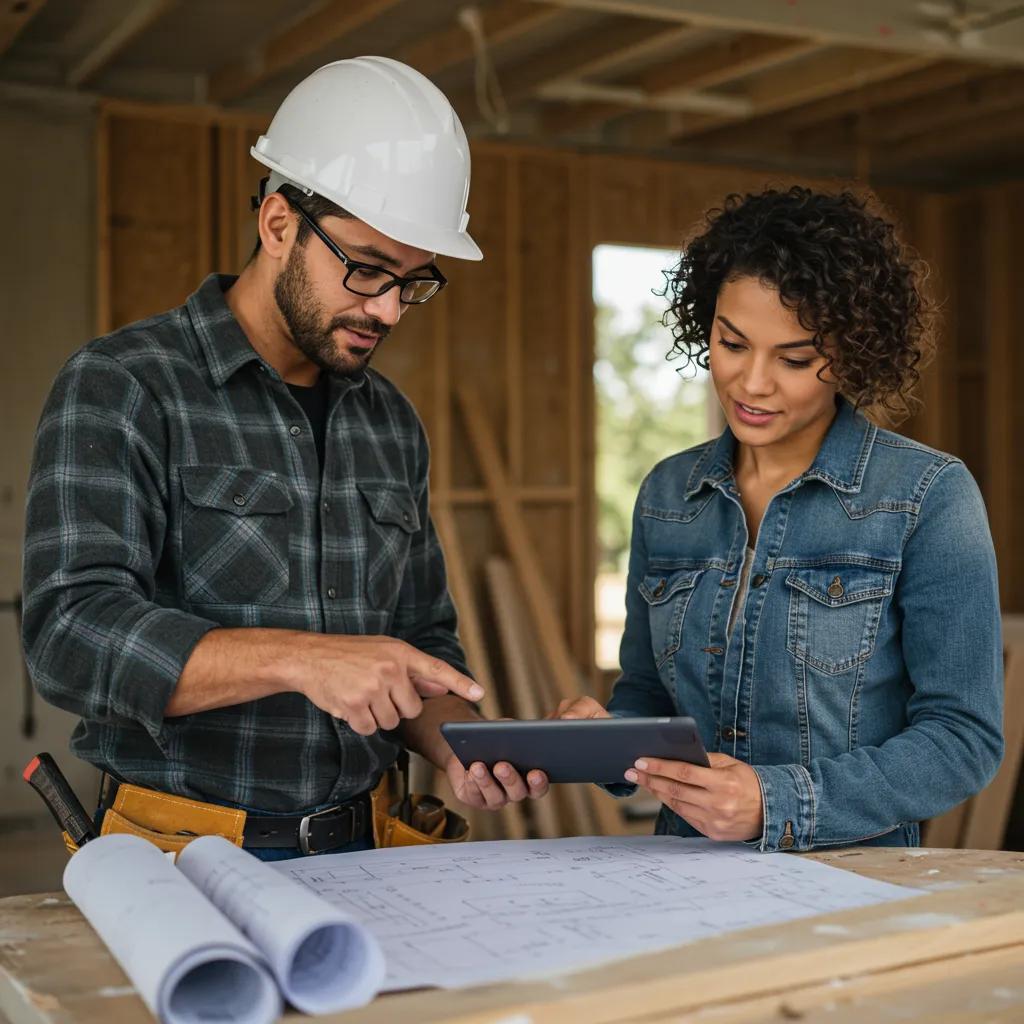
What to Look for in a Trustworthy Builder for Custom Homes
Finding the right partner to bring your custom home plans to life starts with knowing precisely what to look for in a reputable builder. Homeowners navigating intricate design details, budget considerations, and tight schedules often feel overwhelmed by the choices. This guide provides clear criteria, reputation, expertise, communication, contracts, niche fit, essential vetting questions, and warning signs to guide you from concept to groundbreaking. You’ll discover how to align builder selection with your architectural style, effectively use references and reviews, and easily connect with a vetted professional through a complimentary consultation with Custom Builder Connection.
Key Takeaways
Reputation and experience are foundational; a reputable builder ensures quality craftsmanship, reliable timelines, and financial stability.
Clear communication and structured project management are non-negotiable for minimizing misunderstandings and keeping your build on track.
Contracts, licensing, and insurance verification protect your investment by ensuring legal compliance and accountability throughout the project.
Portfolio review, references, and reviews offer firsthand insights into a builder’s consistency, style alignment, and reliability.
Custom Builder Connection simplifies the process by matching homeowners with vetted, style-appropriate builders for a stress-free start.
Why Choosing a Reputable Custom Home Builder is Vital for Your Dream Residence

A trusted custom home builder lays the groundwork for exceptional execution, cost management, and schedule adherence on your project. Thanks to structured processes and established subcontractor relationships, opting for a builder with a proven track record significantly reduces the risk of budget overruns, design missteps, and construction delays. For instance, a highly reliable builder handles permit acquisition swiftly, coordinates inspections accurately, and maintains consistent site oversight, practices that directly safeguard your investment and preserve project timelines.
How Does a Builder's Reputation Influence Your Project's Outcome?
A builder's reputation is a direct reflection of overall client satisfaction, consistent quality of work, and ethical business conduct. A well-respected contractor typically enjoys strong relationships with suppliers and skilled trades, ensuring high-quality materials and punctual deliveries.
The Significance of a Builder's Reputation
A builder's reputation is a primary indicator of client satisfaction, the caliber of workmanship, and ethical business practices. A well-regarded contractor often maintains robust relationships with suppliers and skilled crews, which guarantees the quality of materials and timely deliveries. This ultimately leads to more straightforward project approvals and exceptional finishes.
What Role Does Experience Play in Custom Home Construction?
Experience demonstrates a builder's capability to interpret unique house plans, anticipate construction challenges, and implement effective solutions. Seasoned builders draw upon past custom projects to optimize site logistics, refine budget estimates, and streamline communication with architects.
The Impact of Experience on Project Oversight
Experienced builders can foresee potential construction hurdles, optimize site logistics, and enhance communication with architects. This experience enables more precise cost projections and predictable timelines, which are essential for a successful custom home build.
How Do Reputation and Experience Affect Your Budget and Schedule?
Combining a strong reputation with practical experience gives homeowners confidence in realistic budgeting and precise scheduling. Contractors with a history of success in similar custom designs can anticipate unforeseen expenses, allocate resources efficiently, and minimize change orders.
What Are the Core Attributes of an Outstanding Custom Home Builder?

Selecting a premier builder involves evaluating several key aspects: portfolio credibility, clear communication, structured project management, contract integrity, legal compliance, and social proof. Each attribute works in tandem to support a successful build, from the initial concept review through the final walkthrough.
How Can You Confirm a Builder’s Experience and Portfolio?
Start by requesting detailed project histories, including floor plans, elevations, and material specifications for three to five recently completed custom homes. Examine on-site progress photos to gauge the consistency of craftsmanship. A comprehensive portfolio showcases a builder’s technical capabilities and design flexibility, confirming they possess the necessary skills for your unique house plans.
Why is Clear Communication Essential Throughout the Construction Process?
Transparent communication fosters collaboration, minimizes misunderstandings, and facilitates prompt problem resolution. Builders who schedule regular site meetings, share digital progress reports, and document change orders in writing build trust and keep homeowners well-informed. Clear communication channels between the homeowner, builder, and subcontractors ensure alignment on design intent and budgetary implications.
How Does Effective Project Management Impact Your Build?
Effective project management involves coordinating trades, procuring materials, and upholding quality standards. Look for builders who utilize scheduling software, assign a dedicated project manager, and maintain consistent on-site supervision.
What Should You Look for in Builder Contracts and Financial Health?
A well-defined contract protects both parties by outlining the scope, payment terms, warranties, and dispute resolution mechanisms. The table below compares common contract types and essential clauses.
Each structure requires precise language regarding payment schedules, lien releases, and post-completion support.
How Crucial Are Licensing, Insurance, and Professional Affiliations?
Proper licensing confirms state or local certification, while liability and workers’ compensation insurance protect against on-site injuries and property damage. Professional affiliations (e.g., NAHB membership) indicate adherence to industry best practices. Verifying these credentials validates legal compliance and commitment to quality construction.
How Do References and Online Reviews Reflect a Builder's Reputation?
References and third-party reviews offer insights into actual client experiences. Homeowners can contact previous clients to inquire about punctuality, budget adherence, and workmanship quality. Positive online ratings and Better Business Bureau profiles further confirm honest business practices.
How Do You Align Builder Selection with Your Custom House Plan Style?
Matching a builder's expertise to your architectural vision ensures meticulous attention to style-specific details, materials, and structural systems.
What Qualities Define a Modern Farmhouse Custom Builder?
Modern Farmhouse specialists excel at integrating clean lines, exposed beams, and diverse material palettes with functional layouts. Key builder attributes include proficiency in structural timber framing, selection of durable exterior finishes, and skillful blending of rustic elements with contemporary touches.
How Does a Builder Collaborate with Architects on Custom Designs?
A collaborative builder-architect relationship facilitates iterative feedback on constructability, cost-effectiveness, and material sourcing. Builders who engage early in the design process translate creative concepts into practical solutions, aligning engineered details with aesthetic objectives.
What Are the Essential Questions to Ask During Your Custom Builder Consultation?

Approaching a consultation prepared with targeted questions will reveal the builder’s depth of knowledge, responsiveness, and alignment with your project priorities.
Which Questions Best Reveal a Builder’s Experience and Track Record?
“Can you describe similar custom projects you’ve completed recently?”
“What unique challenges did you encounter on those homes and how did you resolve them?”
“How many active residential builds do you manage concurrently?”
“Could you share recent before-and-after photos and client contact information?”
“What warranty and post-completion services do you offer?”
These inquiries → highlight practical expertise → help you assess compatibility.
How Can You Evaluate Communication and Problem-Solving Abilities?
Ask builders to detail their typical update frequency, preferred communication methods, and provide examples of how they address unexpected site issues. Assess their active listening skills, the clarity of their responses, and their ability to propose actionable plans. Communication assessment → predicts collaboration quality → supports proactive problem resolution.
What Financial and Contractual Details Should You Clarify?
Payment schedule milestones and retainage policy
Procedures for approving change orders and additional cost estimates
Lien waiver requirements for subcontractor payments
Schedule for deposit, progress draws, and final payment
Detailed scope of work with allowances and exclusions
Clarifying these terms → prevents budget surprises → establishes mutual accountability.
How Do You Verify Licensing, Insurance, and Credentials?
Request copies of current licenses, proof of liability and workers’ compensation insurance, and any relevant trade certifications. Confirm licensing status with local regulatory bodies and insurance coverage through carrier verification. Credential verification → ensures legal protection → reduces liability exposure.
What Are Common Warning Signs to Watch For When Selecting a Custom Home Builder?

Recognizing potential issues early on helps homeowners avoid unreliable contractors and protect their investments.
How Can You Identify Warning Signs in a Builder's Reputation?
Be alert for negative patterns such as frequent client complaints regarding delays, unresponsiveness, or quality concerns. Numerous online disputes or unresolved Better Business Bureau complaints often signal underlying systemic problems. Reputation red flags → indicate potential risk → warrant deeper vetting.
What Contract and Financial Issues Should Raise Concerns?
Vague contract language, unusually low bids, or requests for substantial upfront deposits may suggest financial instability or hidden costs. Builders who avoid providing transparent cost breakdowns or attempt to bypass written agreements present significant risks. Contract red flags → jeopardize financial security → lead to disputes.
How Does Poor Communication Impact Your Building Experience?
Builders who miss scheduled meetings, fail to return calls, or provide unclear updates create uncertainty and potential project delays. Poor responsiveness → hinders decision-making → increases stress and slows overall progress.
What Are the Next Steps to Connect with a Qualified Custom Home Builder?
After identifying essential qualities and vetting methods, the final step is to engage a trusted intermediary that simplifies the builder selection process.
How Does Booking a Free Consultation Streamline Your Builder Search?
Scheduling a complimentary consultation with Custom Builder Connection. We connect you with pre-vetted local contractors who align with your style, budget, and timeline. This service saves valuable time by filtering out unsuitable candidates and providing personalized recommendations tailored to your custom house plans.
What Should You Expect During the Initial Consultation Process?
During your consultation, you will:
Review your design vision and functional requirements in detail
Receive curated builder profiles featuring portfolios, credentials, and client feedback
Discuss preliminary budgets, scheduling expectations, and communication preferences
Frequently Asked Questions
Q1. Why should I prioritize a builder’s reputation when choosing one for my custom home?
A strong reputation reflects consistent client satisfaction, reliable subcontractor relationships, and high-quality execution, all of which safeguard your investment.
Q2. How do I know if a builder’s experience aligns with my project?
Request a portfolio of similar projects, review photos of past builds, and ask about specific challenges they’ve overcome on homes like yours.
Q3. What contract type is best for custom home construction?
Fixed-price contracts offer predictability, while cost-plus contracts provide transparency. Design-build contracts streamline design and construction under one agreement.
Q4. How can I spot red flags when evaluating a builder?
Be cautious of vague contracts, unusually low bids, lack of references, poor communication, or requests for large upfront deposits.
Q5. How does Custom Builder Connection help homeowners find the right builder?
By offering free consultations and curated recommendations, it connects you with vetted professionals who align with your budget, style, and timeline.
Conclusion
Building your dream home begins with selecting a builder who combines an excellent reputation, extensive experience, clear communication, financial transparency, and specialized expertise. By asking pertinent questions, recognizing potential red flags, and verifying quality through references and reviews, you can minimize risks and maximize your satisfaction. When you're ready to proceed, book your free consultation with CBC to connect with a qualified custom home builder perfectly suited to your custom house plans.


